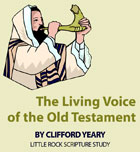Official Website of the
Catholic Diocese of Little Rock
Psalms: Divinely inspired prayer, praise
Published: December 12, 2009
This is the fifth column in a six-part series
By Clifford M. Yeary
Associate Director, Little Rock Scripture Study
Every Sunday, as Catholics all over the world gather to celebrate the Eucharist, the sacred Scriptures are proclaimed to God’s people in four separate readings.
The first is usually (outside of Easter) taken from the Old Testament. The “second” reading is always from the New Testament, but not a Gospel. The “third” is always a reading from one of the four Gospels. The count is misleading, however, for between the first reading and the “second” is another proclamation of Scripture, frequently sung. This is usually one of the Psalms, which are every bit as inspired Scripture as any other of the three readings.
 There is something special about the Psalms. All the other proclamations of Scripture are the word of God proclaimed to us. They are God speaking to us, nourishing us, as the focus of divine love and good will.
There is something special about the Psalms. All the other proclamations of Scripture are the word of God proclaimed to us. They are God speaking to us, nourishing us, as the focus of divine love and good will.
The Psalms are also the word of God, but as employed in our eucharistic liturgy, they are the divinely inspired words of our praise and adoration of the God who has redeemed us in Jesus Christ. In the Psalms, we are given inspired words to speak to God, words which lift our hearts and minds in praise and thanksgiving.
As inspired prayer, the Psalms are not unique in the Bible. The song of praise in thanksgiving for pharaoh’s horses and chariots being tossed into the sea (Exodus 15:1-21) and Deborah’s song of victory after defeating the Canaanites (Judges 5) are considered to be among the oldest pieces of literature recorded in Scripture.
The song of Hannah (1 Samuel 2:1-10), proclaimed in thanksgiving for God’s love in granting her a son (the prophet Samuel), is rich with themes and phrases that are echoed in Mary’s Magnificat (Luke 1:46-55). The song of the three children in Nebuchadnezzar’s fiery furnace, found in the Deutero-canonical version of Daniel (3:52-90), is prayed in the Church’s Liturgy of the Hours on Sunday mornings.
The Psalms, however, are the only book of the Bible formed entirely by prayers. Most recognizable of all is Psalm 23, with its peaceful images of the Lord as a shepherd whose care never ceases to lead us to green pastures and still waters, keeping us safe from any enemies.
Psalm 119, with its 176 verses, is by far the longest psalm in the Bible. It is an acrostic poem in 22 sections, each section eight verses long. The 22 letters of the Hebrew alphabet take turns in alphabetic order in beginning every one of the eight verses in its proper section. The entire psalm loosely revolves around the theme of diligently observing God’s instruction.
Psalm 117, the shortest of psalms, is worth memorizing and praying: “Praise the LORD, all you nations; glorify him, all you peoples! For steadfast is his kindness toward us, and the fidelity of the LORD endures forever.”
The Psalms are poetry, and they frequently rhyme, but not in the way English ears would recognize. The “rhymes” in Hebrew poems most often appear in the mirroring of images and ideas, rather than in sounds.
As an example of the way dual phrases are used in the Psalms to poetically mirror each other, notice how the following phrases from Psalm 116 nearly repeat the thoughts they convey, but with different words (italics are added to emphasize the mirroring thought): “I love the Lord because he has heard my voice in supplication, because he has inclined his ear to me the day I called. The cords of death encompassed me; the snares of the nether world seized upon me …” (verses 1-3a).
The Psalms are prayers, but they are also ancient prayers from a culture vastly different from our electronic, supersonic, individualistic, consumer society. The Psalms make room for every human emotion possible in the face of the chaotic, warring, disease-wracked, perilous lives that came with the times. As a result, some of the psalms (58 and 137 are examples) seem almost bloodthirsty in their cries for punishment against others.
We may not be comfortable praying with such vengeance, but we would be wise to remember God’s willingness to hear the anguish of those who suffer unspeakably. Jesus teaches us to love our enemies (Matthew 5:44), but God does not ignore those who suffer injustice. “(H)e rescues the poor when they cry out, the oppressed who have no one to help” (Psalm 72:12).
Whatever prayer you have in your heart, you are bound to find a psalm to give it expression.
Study Questions
1. If you have a favorite Psalm, what is it and why is it your favorite?
2. What difference, if any, does it make to you if a Psalm is sung or simply recited at worship?
3. What are some examples of prayers and praises in the Bible that are not in the Book of Psalms?
4. Why might Psalms which ask for God’s vengeance on enemies have found their way into the Bible?
This article was originally published in Arkansas Catholic Dec. 12, 2009. Copyright Diocese of Little Rock. All rights reserved. This article may be copied or redistributed with acknowledgement and permission of the publisher.









